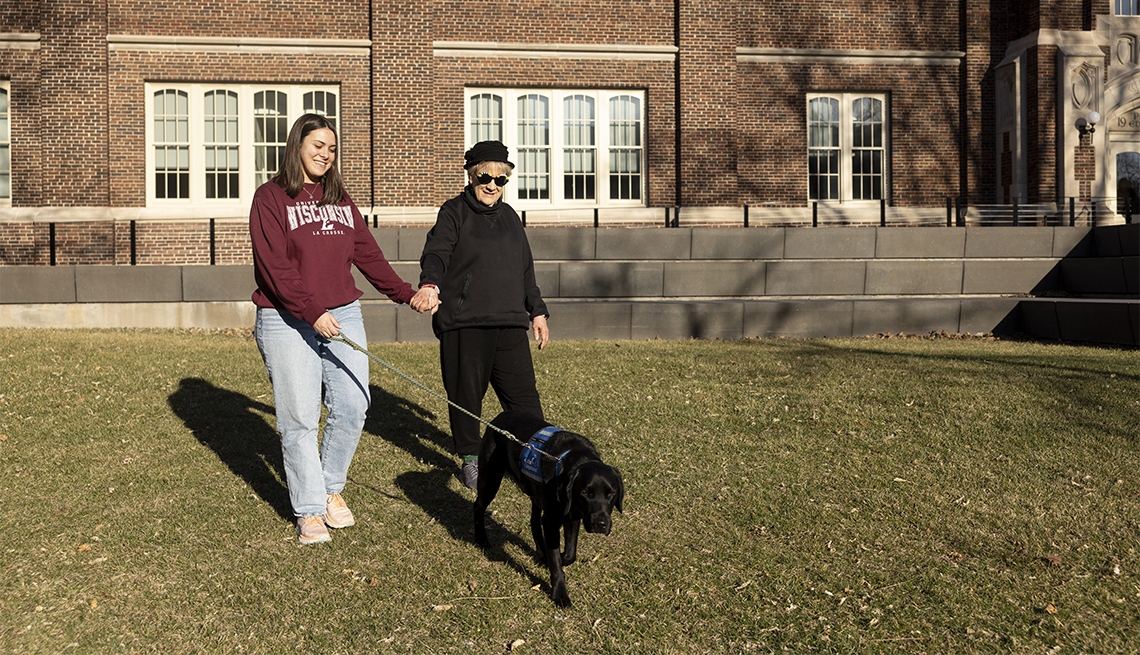AARP Hearing Center

Susan Murray, 75, of La Crosse, suspects her walking partner—a college student, cyclist and kayaker—may have been a bit surprised when she was able to keep up with him. She even used stairs instead of elevators during their indoor treks.
The retired professor of therapeutic recreation and child life makes it a point to stay active—in part so she can continue to volunteer with disaster relief efforts around the country. She has helped children at the sites of a condo collapse, a mass shooting and a military installation where refugees received resettlement aid, among other situations.
“I try to stay very conditioned physically,” she says.
Murray is one of about 50 participants in the Walk With an Eagle program at the University of Wisconsin-La Crosse, where she used to teach. The program matches up recreational therapy students with older adults for weekly walks that help promote intergenerational connections.
AARP Wisconsin collaborates with the university on the program as part of its efforts around the state to promote exercise and healthy living among older residents of all ability levels.
In Milwaukee, AARP hosts Walk With a Doc, monthly Saturday morning walks led by local emergency medicine physician Christopher Ford.
“You’re not only taking care of your body, but you’re taking care of your mind,” Ford says.
A daily walk can lower the risk of heart disease, stroke, high blood pressure, obesity and type 2 diabetes, according to the National Institutes of Health. An analysis of 17 different studies published by the European Journal of Preventive Cardiology last year found that even walking just under 4,000 steps per day can reduce a person’s risk of dying from any cause.
Ford kicks off the walks with a short presentation on a wellness topic, such as fall prevention. People come with partners, friends, grandchildren, care recipients—or just on their own. Participants walk at their own pace.
“There’s always somebody to walk with you, even if you’re using a wheelchair or walker,” says Amber Miller, an AARP Wisconsin associate state director of community outreach.
AARP launched the walks two years ago in connection with the international nonprofit Walk With a Doc. From January through April, the walks are held inside the Mayfair Mall in Wauwatosa. When temperatures warm up, they center around local parks.
Anyone can join the walks, and no registration is required. And the talks are recorded for independent walkers to enjoy later.
The Walk With a Doc program has more than 500 chapters worldwide. People can find an existing walking group or apply to start a chapter in their area at
walkwithadoc.org.
Protecting pedestrians
Making streets safer for walkers and cyclists is also a priority for AARP Wisconsin.
Last year, the organization held a “pedestrian dignity walk” with Jonathon Stalls, author and founder of the program Walk2Connect, and local disability rights advocates in La Crosse. The event brought together participants who walk, use wheelchairs and take public transit to talk about solutions to help protect pedestrians.
AARP in 2024 plans to hold events around the state to promote pedestrian safety, including during National Week Without Driving in the fall.

In LaCrosse, Murray says she appreciates that the routes for the Walk With an Eagle strolls, which run mostly through the university campus, are smooth and easy to navigate. In comparison, many of the sidewalks near her home, which is close to downtown, are uneven.
“I have to really watch the ground when I walk so I don’t trip,” Murray says of her daily 3-mile walks.
Learn more about walking programs and upcoming pedestrian safety events at aarp.org/wi.
_______________________
Making Communities More Livable for All Ages, One Small Grant at a Time
Pickleball enthusiasts in Gays Mills, west of Madison, wanted outdoor courts in their hometown. Why not convert underutilized tennis courts into ones they could use for the popular paddle sport?
Village officials had no objections—but also no money to make it happen. So a group of players rallied and applied for an AARP Wisconsin Small Dollar, Big Impact grant. The awards of up to $1,000 each help fund local projects that make communities more livable for residents of every age.
Previous grants have funded crafting sessions for older residents and their grandchildren in Greendale, new walking paths in Shawano County, free outdoor movie nights in Juneau and “Cooking With Seniors” classes in Milwaukee.
The Gays Mills group received a grant in part because the refurbished courts would also be open to players from surrounding towns, says Darrin Wasniewski, an AARP Wisconsin associate state director of community outreach.
The Small Dollar, Big Impact program is open to formally organized nonprofits and governmental entities. The amount can be a portion of or the total cost of a project. All projects must be completed within 60 days of the award announcement.
AARP reviews applications on a rolling basis. Learn more about the program and how to apply at aarp.org/WIsdbi.
Joanne Cleaver, a North Carolina- based journalist, covers business, personal finance and other issues. She has written for the Bulletin since 2013.
More on Fitness































































